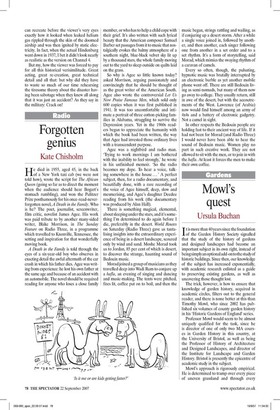Forgotten genius
Kate Chisholm Hedied in 1955, aged 45, in the back of a New York taxi cab (we were not told how), wrote the script for The African Queen (going so far as to direct the moment when the audience should hear Bogart's stomach rumbling), and won the Pulitzer Prize posthumously for his once-read-neverforgotten novel, A Death in the Family. Who is he? The poet, journalist, screenwriter, film critic, novelist James Agee. His work was paid tribute to by another many-sided writer, Blake Morrison, in The Sunday Feature on Radio Three, in a programme which travelled to Knoxville, Tennessee, the setting and inspiration for that wonderfully moving book.
A Death in the Family is told through the eyes of a six-year-old boy who observes in exacting detail the awful aftermath of the car crash in which his father dies. Agee was writing from experience: he lost his own father at the same age and because of an accident with an automobile. The novel should be required reading for anyone who loses a close family member, or who has to help a child cope with their grief. It's also written with such lyrical beauty that the American composer Samuel Barber set passages from it to music that nostalgically evokes the balmy atmosphere of a southern night, blue-black velvet sky lit up by a thousand stars, the whole family moving out to the yard to sleep outside on quilts laid on the grass.
So why is Agee so little known today? asked Morrison, arguing passionately and convincingly that he should be thought of as the great writer of the American South. Agee also wrote the controversial Let Us Now Praise Famous Men, which sold only 600 copies when it was first published in 1941. It was too uncomfortable and intimate a portrait of three cotton-picking families in Alabama, struggling to survive the Depression years. Yet in the 1960s readers began to appreciate the humanity with which the book had been written, the way that Agee had invested those ordinary lives with a transcendent purpose.
Agee was a nightbird and radio man. 'Trying to work mornings I am bothered with the inability to feel strongly,' he wrote in his unfinished memoir. 'So the radio becomes my dope. To hear a voice, talking somewhere in the house ... ' A perfect subject, then, for a radio documentary, and beautifully done, with a rare recording of the voice of Agee himself, deep, slow and mesmerising, and Agee's daughter Deedee reading from his work (the documentary was produced by Alan Hall).
There is something magical, elemental, about sleeping under the stars, and it's something I'm determined to do again before I die, preferably in the desert. World Routes on Saturday (Radio Three) gave us tantalising insights into the extraordinary experience of being in a desert landscape, scoured only by wind and sand. Moshe Morad took us to Jordan, 85 per cent of which is desert, to discover the strange, haunting sound of Bedouin music.
Morad joined a group of musicians as they travelled deep into Wadi Rum to conjure up a hafla, an evening of singing and dancing and music-making. The tents were pitched, fires lit, coffee put on to boil, and then the music began, strings rattling and wailing, as if conjuring up a desert storm. After a while a single voice joined in, followed by another, and then another, each singer following one from another in a set order and to a set rhythm. It's a form of storytelling, said Morad, which mimics the swaying rhythm of a caravan of camels.
Every so often, though, the pulsating, hypnotic music was brutally interrupted by an electronic burble as yet another mobile phone went off. There are still Bedouin living as semi-nomads, but many of them now go away to college. They usually return, still in awe of the desert, but with the accoutrements of the West. Lawrence (of Arabia) now would find himself among an army of 4x4s and a battery of electronic gadgetry. Not a camel in sight.
In other respects the Bedouin people are holding fast to their ancient way of life. If it had not been for Morad (and Radio Three) I would never have been able to hear the sound of Bedouin music. Women play no part in such creative work. They are not allowed to sit with the men, or to join in with the hafla. At least it forces the men to make their own coffee.

































































 Previous page
Previous page